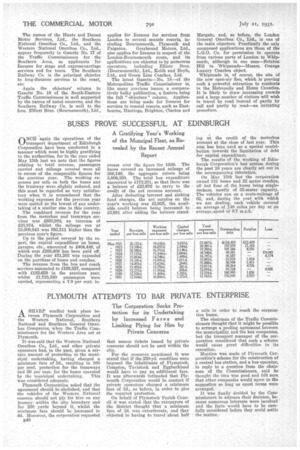PLYMOUTH ATTEMPTS TO BAR PRIVATE ENTERPRISE
Page 58

If you've noticed an error in this article please click here to report it so we can fix it.
A SHARP conflict took place be.1"1. tween Plymouth Corporation and the Western National, Southern National and Southern General Omnibus Companies, when the Traffic Commissioners for the Western Area sat at Plymouth.
It was said that the Western National Omnibus Co., Ltd., and other private operators had, in the past, given a certain amount of protection to the municipal undertaking, having charged a minimum fare of 3d., resulting in 100 per cent, protection for the tramways and 50 per cent. for the buses operated by the municipal undertaking. This was considered adequate.
Plymouth Corporation asked that the agreement should be abolished, and that the vehicles of the Western National concern should not ply for hire on any journey within the city boundary and for 220 yards beyond it, whilst the minimum fare should be increased to 4d. Moreover, the corporation requested B40 that season tickets issued by private concerns should not be used within the city.
Por the concerns mentioned it was stated that if the 220-yd. condition were imposed the inhabitants of Plymstock, Compton, Tavistock and Eggbuckland would have to pay an additional fare. It was afterwards intimated that Plymouth Corporation would be content if private operators charged a minimum faro of 3d., as before, in order to give the required protection.
On behalf of Plymstock Parish Council it was stated that the ratepayers of the district thought that a minimum fare of 3d. was extortionate, and they objected to having to travel about half a mile in order to reach the corporation buses.
The chairman of the Traffic Commissioners thought that it might be possible to arrange a pooling agreement between the municipality and the bus companies, but the transport manager of the corporation considered that such a scheme would cause great difficulties in its execution.
Mention was made of Plymouth Corporation's scheme for the construction of a central bus station, and a bus operator, in reply to a question from the chairman of the Commissioners, said he thought the idea was good and felt sure that other companies would agree to the suggestion so long as equal terms were arranged.
It was finally decided by the Commissioners to adjourn their decision, because numerous interests were involved and the facts would have to be carefully considered before they could settle the matter.




































































































